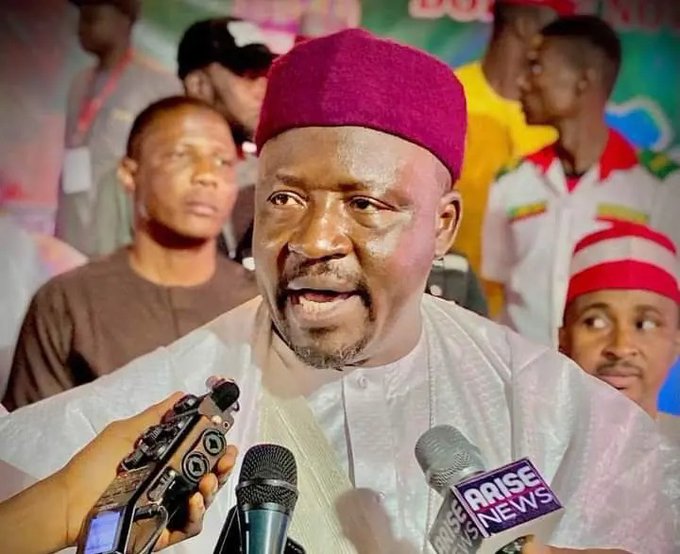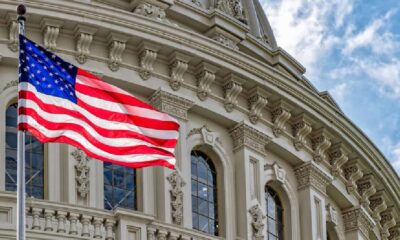News
Honestly, I collect N21m monthly allowance —Nigerian Senator, Kawu confesses

The issue of federal lawmakers’ salaries and allowances has continued to spark controversy across Nigeria.
This follows a claim by Senator Abdurrahman Kawu Sumaila (NNPP – Kano South) that he receives N21 million in monthly allowances, in addition to a monthly salary of around N1 million.
Former President Olusegun Obasanjo recently criticized National Assembly members, accusing them of setting inflated salaries and allowances for themselves in violation of existing laws.
Senator Shehu Sani, who served Kaduna Central during the 8th Assembly, previously revealed that each Senator receives a monthly running cost of N13.5 million, on top of the N750,000 monthly allowance stipulated by the Revenue Mobilisation, Allocation and Fiscal Commission (RMAFC).
On Tuesday, the RMAFC disclosed that the actual total monthly salary and allowances for each Senator amounts to N1,063,860.00.
The breakdown provided by the Commission includes: a basic salary of N168,866.70; motor vehicle fuelling and maintenance allowance of N126,650; personal assistant allowance of N42,216.66; domestic staff allowance of N126,650.00; entertainment allowance of N50,660.00; utilities allowance of N50,660.00; newspapers/periodicals allowance of N25,330.00; wardrobe allowance of N42,216.66; house maintenance of N8,443.33; and constituency allowance of N422,166.66.
In an interview with BBC Hausa Service on Wednesday morning, Senator Sumaila acknowledged that while his monthly salary is fixed by the RMAFC, it is under N1 million.
He stated, “My monthly salary is less than N1 million. After deductions, the figure comes down to a little over N600,000,” adding that “Given the increase effected, in the Senate, each Senator gets N21 million every month as running cost.”
Shehu added that some “allowances are regular while others are non-regular. Regular allowances are paid regularly with basic salary while non-regular allowances are paid as of when due.
“For instance, furniture allowance (N6,079,200 million) and severance gratuity (N6,079,200 million) are paid once in every tenure and vehicle allowance (N8,105,600 million) which is optional is a loan which the beneficiary has to pay before leaving office.
RMAFC Chairman, Muhammed Bello Shehu, clarified on Tuesday that some allowances are regular and paid alongside the basic salary, while others are non-regular and disbursed as due.
For instance, furniture and severance gratuity allowances are one-time payments per tenure, and vehicle allowances, which are optional, are given as loans that must be repaid before leaving office.
Shehu detailed that the total monthly entitlement of each Senator includes a basic salary of N168,866.70; motor vehicle fuelling and maintenance allowance of N126,650.00; personal assistant allowance of N42,216.66; domestic staff allowance of N126,650.00; entertainment allowance of N50,660.00; utilities allowance of N50,660.00; newspapers/periodicals allowance of N25,330.00; wardrobe allowance of N42,216.66; house maintenance of N8,443.33; and constituency allowance of N422,166.66.
He noted that, except for a few high-ranking officials such as the President, Vice President, Senate President, and Speaker of the House of Representatives, other public and legislative officers are no longer provided with housing as they were previously.
The RMAFC Chairman also addressed allegations of additional allowances not covered by the Remuneration (Amendment) Act, 2008, urging that any such claims be clarified by those who make them. To prevent misinformation and ensure transparency, he encouraged interested parties to consult the RMAFC website for detailed information on the current remuneration package for political, public, and judicial office holders in Nigeria.
Shehu also expressed frustration that the RMAFC lacks constitutional authority to enforce compliance with the official remuneration package, a gap he indicated is being addressed by the National Assembly.
News
Don’t sabotage war on terrorism, NEYGA warns, lauds DSS

By Francesca Hangeior
The Northern Ethnic Youth Group Assembly (NEYGA) has cautioned against actions that could undermine Nigeria’s fight against terrorism, expressing concern over what it described as an emerging campaign to discredit the Department of State Services (DSS) and weaken public confidence in the agency.
In a statement issued Tuesday in Abuja, NEYGA spokesperson Ibrahim Dan-Musa commended the DSS for its vital role in ensuring national stability and combating banditry and terrorism.
Dan-Musa dismissed recent reports allegedly from unidentified local hunters accusing DSS operatives of misusing advanced telephone tracking technology, describing them as baseless and part of a smear campaign.
“The reports claimed that the technology, meant to aid in the rescue of kidnap victims, was instead being used by some operatives to extort money from criminals in exchange for concealing their locations.
“While we do not, and certainly cannot, speak officially for the DSS, we must state without fear of contradiction that such stories were fabricated to tarnish the agency’s image.
“We are not surprised that this falsehood is being spread by the same self-styled activist who falsely accused the DSS of abducting civil rights activist, Comrade Usman Okai Austin, to serve certain political interests. Comrade Austin has since disowned the said activist and publicly apologized for his unfounded allegations against the northern governor.”
The group also recalled how the same “activist,” in a viral video, falsely accused the DSS of invading the Federal High Court on the day the Economic and Financial Crimes Commission (EFCC) arraigned former Governor Yahaya Bello.
“It turned out that no DSS operative was anywhere near the court on the said day,” the group pointed out.
“We cannot thank President Bola Tinubu enough for appointing a thoroughbred professional like Mr. Tosin Ajayi as Director General of the DSS. From the agency’s remarkable exploits since Ajayi assumed office, we are proud to say that President Tinubu made an excellent choice.
“We in the North are particularly pleased with the relentless efforts of the DSS to make the North and the rest of Nigeria safer. Very recently, Governors Dauda Lawal of Zamfara and Ahmadu Fintiri of Adamawa publicly praised the DSS—not only for seizing large caches of arms and arresting or neutralizing scores of bandits and kidnappers, but also for securing the release of kidnapped Roman Catholic priests,” the group said.
“All of these achievements poke holes in the tissue of lies being peddled by the self-styled activist,” it stressed.
The group further highlighted an incident from 2018, when a court awarded ₦10 million in damages against the DSS over the 2016 accidental shooting in Bauchi of a businessman originally from Sokoto.
“No Director General agreed to pay the compensation until Tosin Ajayi came into office. Not only did he pay the ₦10 million, he doubled the amount. Nothing could be more humane. We deeply commend DG Ajayi for that,” the group said.
NEYGA also recalled recent public apologies issued by several media outlets for falsely reporting that the DSS stormed the Lagos State House of Assembly.
“The DSS’s acceptance of the apologies and decision to drop charges against the media houses is a sign of civility by the secret police, which we wholeheartedly commend,” the group added.
“We had imagined that, as a serial contestant for the office of President, this activist would be more circumspect, lie less, and demonstrate greater patriotism in the way he speaks about Nigeria—especially if, by some chance, he ends up occupying the nation’s highest office one day. Sadly, that has not been the case,” NEYGA said.
“We commend the maturity of the DSS leadership for enduring the barrage of lies constantly thrown at it by these so-called activists. Nigerians have seen through their antics and know they do not mean well for our beloved country.
“We urge the DSS not to be distracted by these merchants of falsehood and to remain steadfast on the path of making Nigeria safer,” the group said.
News
Insecurity: PDP raises alarm over ceaseless killings in Nigeria

* Urges Aiyedatiwa to be proactive in his duties
By Francesca Hangeior
The Peoples Democratic Party (PDP) in Ondo State has urged Gov. Lucky Aiyedatiwa to be alive to his duties of safeguarding the lives and property of residents of the state.
The party’s Director of Media and Publicity in the state, Mr Leye Igbabo, stated this in a statement issued on Tuesday in Akure.
Igbabo said that the party was alarmed by the alleged ceaseless killings of hapless residents of the state by gunmen.
He said that victims of such killings were lawfully engaging in their daily activities needed to bring food to their tables.
“The party cannot, in all honesty, find reasons why such assailants could operate without any form of resistance for months running, in a state where there is said to be a valid government in place.
“Gov. Aiyedatiwa has indeed failed in his constitutional duty as enshrined in Section 14(2)(b) of the 1999 Constitution (as amended), in that he can no longer secure and protect lives and property of citizens of Ondo State.
“It is heart-wrenching to note that in less than one month, about 50 persons have been gruesomely massacred in various settlements within the state,” he said.
Igbabo expressed concerned that no arrest or prosecution had been made in the wake of these incidents.
He said that the party had been wondering if a government still exists in the state in the face of what he described as unprovoked and unrestrained killings.
“These killings are one too many and indicative of helplessness, hopelessness and huge compromise of those in the corridor of power in Ondo State,” he stated.
Igbabo urged President Bola Tinubu to urgently address the situation, as it appeared that the state government was incapacitated in tackling the menace.
News
UK payrolled employees drop by 78,000

By Francesca Hangeior
The number of UK payrolled workers and job vacancies slid ahead of businesses being hit by tax hikes and US tariffs, official data showed Tuesday.
Preliminary figures for March showed the number of payrolled employees dropped by 78,000 from February, the Office for National Statistics said in a statement.
That compared with a decrease of 8,000 in February from January, the ONS added.
Job vacancies in the three months to March dipped below pre-pandemic levels for the first time since 2021.
Wage growth, however, remained elevated, with the annual growth in employees’ average regular earning edging up to 5.9 percent in the three months to the end of February.
The figures cover the period before the introduction this month of business tax hikes laid out in the Labour government’s maiden budget in October.
It “provides some tentative evidence that businesses started to respond to rises in business taxes and the minimum wage from this month by reducing headcount”, said Capital Economics UK economist Ashley Webb.
Businesses have in particular criticised the tax increases, warning it could lead to them holding back on hiring and limiting pay rises.
The ONS added that the unemployment rate remained at 4.4 percent in the three months to the end of February.
Webb said jobs growth could be further impacted “from the recent increase in uncertainty due to the chaotic way US tariff policy is being set”.
The UK was hit with a 10 percent levy on imports to the United States as part of President Donald Trump’s sweeping tariffs, which also target sectors like steel, aluminium and autos.
It creates a difficult situation for the Bank of England which has to contend with persistently high wage growth and stubborn inflation as well as the risks to the economy posed by tariffs.
“With pay growth still running above levels consistent with the inflation target, the… (BoE) will likely continue its gradual approach to cutting interest rates,” said Yael Selfin, chief economist at KPMG UK.
“However, that will be set against growing risks to the domestic economy which are likely to depress labour market activity,” she added.
The BoE recently halved its forecast for the country’s total output this year, blaming global risks amid US tariff threats and deteriorating UK business confidence.
That came as the central bank cut in February its key interest rate by a quarter point, the third such reduction in six months.
-

 News4 hours ago
News4 hours agoSHOCKING! One month after giving birth, woman discovers another baby in her womb
-

 News23 hours ago
News23 hours agoYou must refund N300m, Rivers State tells NBA
-

 News10 hours ago
News10 hours agoPeter Obi speaks as Benue govt. blocks humanitarian visit
-

 Foreign24 hours ago
Foreign24 hours agoUS orders 30-day registration for all foreign nationals or face jail, deportation
-

 News4 hours ago
News4 hours agoAngry investors raid CBEX office, loot assets in Ibadan after digital Platform crash
-

 News11 hours ago
News11 hours agoFUOYE VC suspended over sexual harassment allegations
-

 News11 hours ago
News11 hours agoPower Generation Companies Express Concern Over N4 Trillion Unpaid debts, Warn Imminent Shutdown
-

 News4 hours ago
News4 hours ago‘Not something I’d wish on anyone’ — Melinda Gates opens up on divorce


















